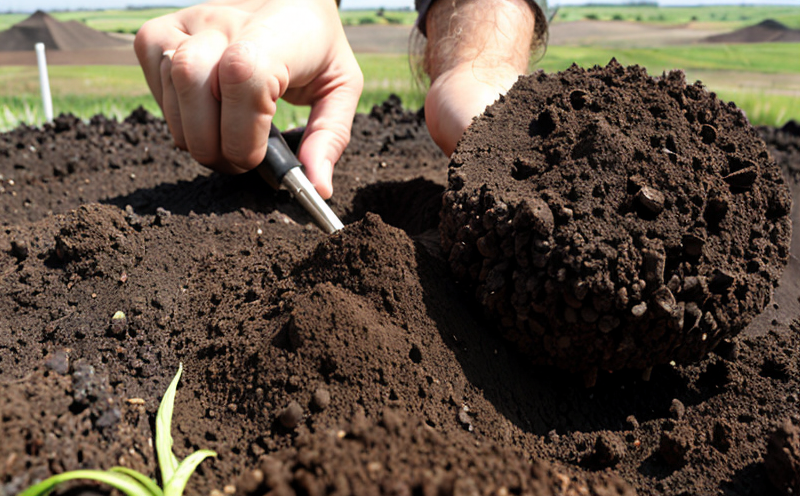ASTM D6239 Semi Volatile Organic Carbon Test in Water
The ASTM D6239 semi-volatile organic carbon (SVOC) test is a critical procedure used to measure the content of SVOCs present in water samples. This method is essential for environmental and industrial sectors where water quality monitoring, compliance verification, and R&D activities are paramount.
SVOCs represent a broad class of compounds that include semi-volatile organic chemicals such as polycyclic aromatic hydrocarbons (PAHs), pesticides, and other synthetic chemicals. The ASTM D6239 method is widely used in water & wastewater testing to ensure compliance with regulatory standards like the US EPA and EU directives such as the Water Framework Directive (WFD).
The test involves several steps, starting from sample collection and pre-treatment to the actual analysis. During sample preparation, the water matrix is filtered, concentrated using solid-phase extraction (SPE), and subsequently analyzed by thermal desorption-gas chromatography-mass spectrometry (TD-GC-MS). This procedure ensures accurate quantification of SVOCs, which are known for their persistence in the environment.
The ASTM D6239 protocol is designed to target a wide range of compounds with boiling points between 150°C and 400°C. The method is particularly useful for detecting compounds that may not be easily identified by other analytical techniques, such as GC-MS or HPLC.
The significance of this test lies in its ability to provide comprehensive information about the presence and levels of SVOCs in water samples. This data is crucial for industries like chemical manufacturing, pharmaceuticals, and wastewater treatment facilities that need to ensure their processes do not introduce harmful chemicals into the environment.
Our laboratory adheres strictly to ASTM D6239 guidelines, ensuring accurate and reliable results. We use state-of-the-art equipment such as high-performance GC-MS systems with optimized thermal desorption units. These instruments allow us to achieve detection limits that meet or exceed regulatory requirements.
The testing process begins with the collection of water samples from various sources, including municipal supplies, industrial outflows, and surface waters. Post-collection, these samples undergo rigorous quality control checks before undergoing SPE concentration followed by thermal desorption for GC-MS analysis.
Our team of experts ensures that each step of the ASTM D6239 procedure is conducted meticulously to avoid any contamination or loss of analytes. This attention to detail guarantees accurate results and helps stakeholders make informed decisions regarding water quality management.
The importance of this test cannot be overstated, especially in light of increasing environmental awareness and stricter regulations governing industrial waste discharge into aquatic environments. By employing ASTM D6239-compliant methods, we contribute significantly towards maintaining clean, safe, and sustainable water resources.
Applied Standards
| Standard | Description |
|---|---|
| ASTM D6239-18 | Procedure for the Determination of Semi-Volatile Organic Carbon in Water by Thermal Desorption-Gas Chromatography-Mass Spectrometry (TD-GC-MS) |
| EU Water Framework Directive | Directive 2000/60/EC establishing a framework for Community action in the field of water policy. |
| US EPA Guidance on Pollutant Characterization | Guidance document providing detailed information on how to characterize pollutants in environmental media. |
| ISO 15223-1:2008 | Environmental testing laboratories – Part 1: General requirements for the operation of environmental testing laboratories. |
| IEC International Standards | Standards that provide specifications and procedures relevant to electrical, electronic, and related technologies. |
The ASTM D6239 semi-volatile organic carbon test is meticulously aligned with international standards, ensuring accurate and reliable results. Compliance with these guidelines is crucial for maintaining the highest quality of environmental testing services.
Eurolab Advantages
At Eurolab, we pride ourselves on delivering exceptional ASTM D6239 semi-volatile organic carbon test services. Our team of highly qualified experts ensures that every aspect of the testing process adheres to strict quality control measures and industry best practices.
- Advanced Equipment: Utilizing cutting-edge GC-MS systems with optimized thermal desorption units, we provide precise results.
- Comprehensive Quality Assurance: Our laboratory maintains ISO 15223-1:2008 certification, ensuring compliance with international standards.
- Expertise & Experience: With years of experience in environmental testing, our professionals stay updated on the latest methodologies and technologies.
- Prompt Reporting: Timely delivery of reports ensures that clients can act swiftly based on accurate data.
- Certified Personnel: Our staff is trained to handle complex samples with precision and care.
- Eco-Friendly Practices: We employ environmentally friendly methods throughout our testing processes.
Choose Eurolab for your ASTM D6239 semi-volatile organic carbon test needs, and experience the difference in quality and reliability.
International Acceptance and Recognition
The ASTM D6239 semi-volatile organic carbon test is globally recognized for its accuracy and reliability. This method has been adopted by numerous countries, including the United States, Europe, and various Asian nations.
- American Industry: Widely used in US-based chemical manufacturing plants to ensure compliance with EPA regulations.
- European Compliance: Essential for meeting the stringent requirements set forth by the EU Water Framework Directive (WFD).
- Asian Standards: Recognized and implemented in Japan, South Korea, and China for monitoring water quality.
The ASTM D6239 method is also frequently cited in international conferences and publications focused on environmental science and technology. Its widespread acceptance underscores the importance of this test in maintaining global standards for water quality.
By choosing Eurolab for your ASTM D6239 semi-volatile organic carbon testing needs, you can be assured that your results will meet or exceed international standards, thereby enhancing your reputation and compliance status.





